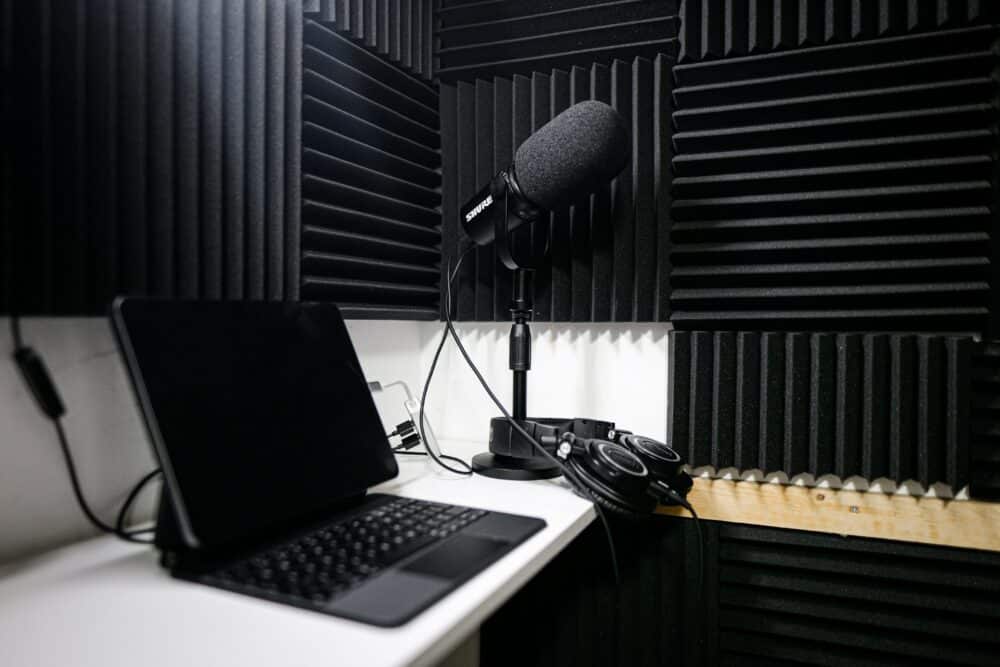
How to Grow a Podcast and Increase Your Audience

As a podcaster, you know that increasing your audience is key to growing your show. But how do you go about doing that? This complete guide will give you tips and tricks on how to grow your podcast audience, from creating valuable content to networking with other podcasters. So what are you waiting for? Start reading and start growing!
Learn how to obtain self-employment insurance in your field:
Freelance Disability Insurance | Freelance Ghost Insurance | Freelance Workers Comp Insurance | Freelance Critical Illness Insurance | Freelance E&O Insurance | Freelance Airbnb Host Insurance | Freelance Commercial Auto Insurance | Freelance Commercial Property Insurance | Freelance Utah Home Insurance | Freelance Amazon Flex | Freelance Carpet Cleaning Insurance | Freelance Window Cleaner Insurance | Freelance Pressure Washer Insurance | Freelance Electrician Insurance | Freelance Mechanic Insurance | Freelance Junk Removal Insurance | Freelance Bartender Insurance | Freelance Hair Stylist Insurance | Freelance Barber Insurance | Freelance Taskers Insurance | Freelance Web Designer Insurance | Freelance Doordash Driver Insurance | Freelance Uber Driver Insurance | Freelance Plumber Insurance | Freelance Writer Insurance
All About Podcasting – How to Start Your Successful Podcast
A podcast is a digital audio file made available on the Internet for downloading to a computer or mobile device, typically available as a series, new episodes of which can be received by subscribers automatically.
Sounds simple enough, right? But if you’re thinking about starting a podcast, you might be wondering where to begin.
What is a podcast?

What is the difference between podcasting and traditional broadcasting?
The main difference between podcasting and traditional radio broadcasting lies in the way that the content is transmitted and received. Radio broadcasts typically require special hardware such as a radio receiver, while podcasting allows audio files to be automatically downloaded and played. Podcasting also allows users to manage the content that is transmitted and received, making it a more flexible form of broadcasting than traditional radio.
What You Need to Start a Podcast?
Starting a podcast requires two key ingredients: audio content and a hosting platform.
Audio Content
The audio content of your podcast will be the foundation of your show. This will include the recorded episodes themselves as well as any supporting materials like intro music, outro music, and sound effects. Once you have this content created, you can move on to finding a hosting platform.
Hosting Platform
A hosting platform is where your audio files will live online so that people can listen to them. A good hosting platform will provide you with tools to help you promote and grow your podcasts such as RSS feeds, listener analytics, and more. Additionally, many hosts will also distribute your show to popular platforms like iTunes and Spotify.
Examples of hosts include Podbean, Libsyn, and Blubrry. Of course, there are many other hosts out there for you to choose from – research what’s out there and select the one that best meets your needs.
In addition, you need the right podcast equipment.
Tips for Starting Your Podcast

1) Be Consistent:
When it comes to releasing new episodes of your show, consistency is key. Try to stick to a regular release schedule (e.g., weekly) so that your listeners know when they can expect new content from you.
2) Keep It Short and Sweet:
Unless you’re planning on creating a very long-form show (think 60-90 minutes), try to keep your episodes under 30 minutes. This is especially important if you’re just getting started – shorter episodes are easier to produce and will help you build up momentum as you continue creating new content.
3) Engage With Your Listeners:
Because podcasts are such a personal medium, it’s important to build relationships with your listeners. Respond to comments and questions left on your website or social media pages, and consider recording special “listener episodes” from time to time where you chat with members of your audience about new episode topics they want to hear about.
4) Have Fun!:
Last but not least, remember to have fun! If you’re not enjoying the process then it’s likely that your listeners won’t either. So relax, let loose, and enjoy chatty away!
12 ways to Grow Your Podcast Audience
A strong and engaged podcast audience is the key to a successful show, especially if you plan to monetize the podcast. If you want to grow your podcast audience, there are a few things you can do to make your show more appealing to listeners. Here are the 12 best ways to increase your audience:
#1. Start with a Great Idea That Will Appeal to a Wide Audience
To grow your podcast audience, you need to start with a great idea that will appeal to a wide audience. Your idea doesn’t need to be perfect, but it should be something that you’re passionate about and that you think other people will be interested in. Once you have your idea, there are a few things you can do to make sure it has the best chance of success.
Do Your Research
Before you launch your podcast, it’s important to do your research and make sure there isn’t already something similar out there. There are millions of podcasts out there, so it’s important to find a niche that you can fill. Once you’ve done your research and you’re confident that there’s an audience for your podcast, the next step is to start planning and developing your show.
Planning and Developing Your Show
Now that you have your great idea, it’s time to start planning and developing your show. This is where you’ll decide on things like the format, length, frequency, and guests. It’s important to make sure that you have a clear vision for your show before you start recording. If you’re not sure where to start, there are plenty of resources online that can help you with the planning and development process.
Recording and Editing
Once you’ve planned and developed your show, it’s time to start recording. If you’re not comfortable recording and editing your audio, there are plenty of professionals who can help you with this step. However, if you’re on a tight budget, there are also some great resources available for recording and editing podcasts on a shoestring budget.
#2. Research your topic inside and out so that you can provide valuable information to your listeners
A key component of any successful podcast is a knowledgeable host. After all, listeners tune in to learn about a particular topic, and they expect the host to be an expert on the subject matter. As such, it is essential to spend time researching your topic before recording each episode. By delving deep into the material, you will be better equipped to provide valuable insights and useful information to your listeners. In addition, your audience will appreciate your commitment to delivering high-quality content, and they are likely to stick around for future episodes. So if you want to grow your podcast audience, make sure to do your homework beforehand.
When it comes to growing your podcast audience, quality matters. You need to make sure that every episode provides listeners with something valuable. If you’re delivering great information regularly, people will be more likely to tune in and tell their friends about your show. On the other hand, if your episodes are boring or lack substance, people will quickly lose interest. Put in the time to research each episode thoroughly so that you can provide listeners with an engaging and informative experience.
#3. Choose the right format for your podcast, including length, frequency, and structure
When you’re launching a new podcast, it’s important to choose the right format. This means thinking about things like length, frequency, and structure. The right format will help you keep your audience engaged with your content.
For example, some podcasts are released weekly and are around 30 minutes long. Others are released daily and are only 10 minutes long. There’s no right or wrong answer here – it all depends on what you think will work best for your audience. The important thing is to be consistent with your release schedule so that people know when to expect new episodes.
As far as podcast content goes, there are a few different formats you can choose from. You can have interviews, story-telling, or discussion-based shows. Again, there’s no right or wrong answer – it all depends on what you think will work best for your audience. The important thing is to experiment and find a format that feels natural for you and that keeps your audience coming back for more.
#4. Find the perfect hosting platform for your podcast that will make it easy for people to find and subscribe
Podcasting has become a popular way to share information and stories, connect with listeners, and build a following. If you’re looking to grow your podcast, one of the best things you can do is find the perfect hosting platform. There are a few different options when it comes to podcast hosting, and the best one for you will depend on your specific needs and goals. Some podcast hosting platforms are better for reach and discovery, while others offer more features and control.
Apple Podcasts and Google Podcasts are two of the most popular podcasting platforms, and they both have their strengths and weaknesses. If you’re just getting started with podcasting, it’s a good idea to try out a few different platforms before settling on one. There are also several podcast apps that you can use to listen to podcasts, and many of them have podcast directories. Having a podcast website is another option that allows you to host your podcast on your website. Regardless of which platform you choose, make sure that it’s easy for people to find and subscribe to your podcast. The more accessible your podcast is, the more likely people are to listen to it.
#5. Promote your podcast through social media platforms
A key element to promoting your podcast is doing so through social media platforms. There are several ways to go about this, and which methods you use will largely depend on where your target audience “hangs out” online.
1. Create dedicated social media accounts for your podcast.
If you don’t already have them, create accounts on social media channels where your target audience is most active. This could be Facebook, Twitter, Instagram, Snapchat, or any other platform that makes sense for your show. Once you have your accounts set up, make sure to populate them with engaging content that will get people interested in your podcast. Include links to episodes, teasers or trailers for upcoming episodes, behind-the-scenes photos or videos, and anything else that gives people a taste of what your podcast is all about.
2. Use hashtags strategically.
Hashtags are a great way to get more eyes on your content and attract new listeners to your show. Do some research to find out which hashtags are being used most frequently by other podcasts in your genre, as well as by potential listeners. Once you have a good understanding of which hashtags are being used most often, start incorporating them into your social media posts promoting your podcast. Just be careful not to overdo it – using too many hashtags in one post can come across as spammy and turn people off from checking out your show.
3. Leverage the power of influencers.
Influencers are people with large followings on social media who could help promote your podcast to their audience. If you know of any influencers who might be interested in your show, reach out to them and see if they’d be willing to share it with their followers. You could also collaborate with other podcasters or content creators in your space – guesting on each other’s shows or creating joint content like blog posts or webinars could help introduce new listeners to your podcast.
#6. Stay connected with your podcast listeners

#7. Create a podcast with a video
If you’re looking to grow your podcast, one great way to do it is to create a podcast with a video. You can use a podcast trailer to promote your podcast on YouTube video, and you can also use behind-the-scenes stuff to give people a glimpse of what goes into making your podcast. This can help to attract listeners and get people interested in what you have to say. Plus, it’s a great way to show off your personality and build up a rapport with your audience. So if you’re ready to take your podcast to the next level, consider adding a video component. It could just be the thing that takes it from good to great.
#8. Invest in marketing
If you’re looking to grow your podcast, digital marketing is a great place to start. There are several content marketing strategies you can use to reach new audiences and promote your show, from a guest blog post to search engine optimization. By investing in digital marketing, you can reach a wider audience and build your brand. Additionally, digital marketing can help you to connect with listeners and create deeper relationships with your audience. If you’re serious about growing your podcast, digital marketing is an essential part of your strategy.
#9. Make guest appearances in podcast episodes
One way to help grow your podcast is by becoming a podcast guest on other podcasts. This can help you reach a new audience and broaden your podcast’s appeal. When appearing as a guest, be sure to promote your podcast during the episode. You can also promote your podcast by sharing links to new episodes on social media and through email newsletters. If you build up a good rapport with other podcast hosts, they may be willing to return the favor by having you appear on their show. Guest appearances can be a great way to grow your podcast and reach new listeners.
#10. Use paid advertising
When it comes to growing your podcast, there are several different strategies you can use. One option is to use paid advertising. This can be a great way to attract new listeners, especially if you target your ads to your intended audience. You can run ads on podcast directories, social media platforms, and even other podcasts that your target audience is likely to listen to. Just be sure to choose a particular growth strategy and stick to it; otherwise, you’ll end up wasting money on ads that don’t work.
#11. Organize a podcast tour for your host
A podcast tour is a great way to promote your podcast and grow your audience. By organizing a tour for your host, you can connect with listeners in person and build interest in your show. Here are a few tips for organizing a successful podcast tour:
1. Choose a theme or topic for your tour. This will help you focus your marketing efforts and attract listeners who are interested in what you have to say.
2. Select a group of cities or regions that you would like to focus on. This will help you narrow down your list of potential tour stops.
3. Research venues in each city that would be suitable for hosting a live podcast event. Make sure to consider the size of the venue, the acoustics, and the accessibility of the location.
4. Contact each venue to inquire about availability and pricing. Once you have confirmed dates and locations, begin promoting your tour online and through social media.
5. Finally, don’t forget to create an itinerary for your host so they know where they need to be and when! By following these simple tips, you can successfully organize a podcast tour that will help grow your audience and promote your show.
#12. Use animated videos
A well-made animated video can be a powerful tool for promoting your podcast. By condensing the key themes of your show into a short, engaging clip, you can give potential listeners a taste of what your podcast has to offer. And because animated videos are easy to share, they can help you reach a wider audience. When promoting your show with animated videos, be sure to include a link to your podcast episodes. That way, viewers can easily find and subscribe to your show. You can also use animated videos to tease upcoming episodes or announce new guests. Whatever you do, make sure your videos are funny and engaging – that’s what will attract new listeners to your show.
Final thoughts
If you’re passionate about a certain topic and have something valuable to say, consider starting your podcast! It’s a great way to build an audience around your ideas and grow your online presence. Be sure to use these tips to set yourself up for success. And if you need more advice on getting started with online business ideas, be sure to check out our other blog posts.





